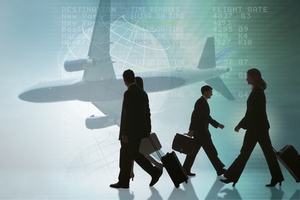
Top 5 Risks Facing Business Travellers
Employers have a variety of risks to consider regarding ‘Duty Of Care’ for travelling team members and Priavo have seen an increase in security concerns and awareness across the board. The rise in cybercrime and extreme weather, increased globalism, evolving technology, political unrest and growing security threats are bringing new challenges. We have outlined the top 5 Travel safety risks Travel Managers and employers should be aware of when considering the safety of business travellers.
A rapid growth in globalisation and connectivity has brought many cyber challenges. Cyber attacks, malware, viruses, data breaches and information leaks are a daily occurrence globally. Negative content can appear almost instantly and identity theft can have a severe impact on your business or livelihood. Travelling employees are becoming increasingly susceptible to various forms of espionage and businesses are often unknowingly hacked and therefore compromised. Adversaries can damage reputations, steal intellectual property, infiltrate corporations and sabotage targets given the correct intelligence. For evidence of this, look no further than DarkHotel: a sophisticated malware campaign that used the Wi-Fi networks of global luxury hotels to target C and V Level executives from major corporations.
Geopolitical Unrest
Its hard to keep up with the way international relations are rapidly evolving with conflicts and disputes between countries and political groups a daily global occurrence, particularly over geographical areas resulting in the displacement of large groups seeking refuge. The political landscape is making it harder for even the most diligent travel managers to predict with any confidence whether a destination will be safe in a fortnight or even a week’s time.
Natural Disasters
Climate change and disasters present an increasing risk. The increase in intensity, frequency and unpredictability of hazards and extreme weather events, combined with a global rise in population and challenges to developing infrastructure in many parts of the world contribute to an increased vulnerability.
Terrorism and Organised Crime
Threats are more sophisticated, and sophisticated threats are becoming more common. Terrorists and criminals are quick to evolve their tactics and are currently doing so at a higher tempo than Counter Terror policies and measures put in place to prevent them. We are likely to see more improvised, innovative and unusual attack methodologies, such as the use of drones.
Complacency
Finally, perhaps the biggest risk faced by business travel is complacency. The majority of business travellers we speak to say they don’t receive any pre-trip travel and security information before travelling, with just 1 in 5 employers using traveller safety platforms for tracking their mobile workforce. Many corporations do not have an adequate travel policy in place to cover essential ‘Duty of Care’ obligations for their business travellers, therefore failing to adequately prepare their mobile workforce.
Business travel risk management faces an uncertain future. On the one hand, businesses are increasingly pursuing international opportunities with globalisation, often in complex and challenging environments and steady growth in business travel is set to continue for the foreseeable future. On the other hand, corporate travellers are faced with new and ever-evolving risks. How things go will largely depend on how Travel Managers, Employers and TMC’s are able to rise to the challenge, embed security process, training, travel policies and harness emerging technology to keep travellers safe.
